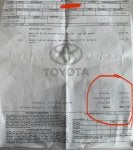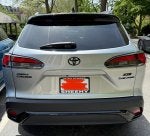UPDATE: After 3 months, the Toyota dealership that has my car has finally called to tell me that it's fixed. They discovered the problem was a flywheel bolt in the engine that was not screwed in correctly from the manufacturer. As I had originally suspected this had nothing to do with contaminated fuel and it was in fact a manufacturer's defect. Despite my annoyance at the beginning of my interactions with this dealership, the dealer I purchased it from and Toyota corporate, Toyota of Watertown did provide a courtesy vehicle that I was able to use throughout the past three months while they worked on the vehicle.
Huge lesson - don't accept the first diagnosis from a mechanic, if you think it makes absolutely no sense at all.
Thanks to everyone who tried to offer support and guidance.
---
I recently purchased a 2025 corolla cross hybrid XSE on April 19, 2025 from Sheehy Toyota of Laurel (Laurel, MD) and drove from DC to Boston on April 20 (I live in DC, but work in Boston). I refueled along the NJ Turnpike (Sunoco station) during the trip and once more on April 21 at a Shell station in Cambridge, MA. I drove the car for several days after this with no issues.
On Sunday, May 4 I had an issue starting my car - there was a knocking (or sputtering) sound and strange smell inside the cabin. I immediately called Toyota care roadside assistance to tow the car to a nearby Toyota dealership in the Boston, MA area. The dealership service dept was closed on Sunday so they were able to look at the car on Monday, May 5. I received a call later that afternoon stating that the problem was contaminated fuel which damaged spark plugs and depleted the cells in the hybrid battery, which would need to be replaced. Total bill $8500+. They recommended that I contact MY insurance company to cover the cost of the repairs! This is after 2 weeks of purchasing a new car that only had 880 miles on it.
After the phone call, I immediately called the Sunoco station along the NJ turnpike and Shell station near my Boston apt to ask whether they had received any complaints about contaminated fuel. No complaints reported. I also checked with the valet service/front desk in the apt to determine if anyone else in the building had reported recent mechanical issues, since the Shell station is closest to our building and many people would likely use it. No reports.
I called the dealership where I purchased the vehicle to complain about the issue - they were not helpful and said that I would need to contact Toyota corporate. When I contacted Toyota corporate, they told me that they would have to believe their certified Toyota mechanic that the problem was contaminated fuel and that this was not covered under the manufacturer's warranty.
Over the next couple days, I filed complaints with the Better Business Bureau, MD Attorney General's Office (Consumer Protection Division) and started communicating with the DC AG’s office and an attorney about steps to taking legal action against Toyota.
However, on Tuesday (May 6) afternoon, I received a call from the Toyota dealership service department that had my car who informed me that they were going to have a deeper look at my car on Wednesday to determine what was wrong. On Thursday afternoon, I received a phone call stating that they were in contact with Toyota corporate and that they would cover the cost of all damages now. They would also put me in a loaner car, whenever I needed one. It was a complete 180 and I'm not sure the reason for the change, but happy for it.
Has anyone else had a similar issue? I don’t believe this is due to contaminated gas that I put in the car. I have a friend who is a VW dealer mechanic who told me that contaminated fuel (water or diesel) would cause an issue almost immediately once you drive away from a gas station. He also said that the hybrid battery is a different system from the gas engine so contaminated gas would NOT affect it, especially not so quickly. He said that many times a dealership mechanic will try to initially come up with a diagnosis that doesn’t trigger the manufacturer warranty because it involves much more paperwork/time - so they try to get the customer to cover recommended repairs first.
I’m really trying to get to the bottom of what is going on here? I'm afraid that even if they fix the car now that there may be ongoing problems due to defective components initially used in the car when manufactured?
Huge lesson - don't accept the first diagnosis from a mechanic, if you think it makes absolutely no sense at all.
Thanks to everyone who tried to offer support and guidance.
---
I recently purchased a 2025 corolla cross hybrid XSE on April 19, 2025 from Sheehy Toyota of Laurel (Laurel, MD) and drove from DC to Boston on April 20 (I live in DC, but work in Boston). I refueled along the NJ Turnpike (Sunoco station) during the trip and once more on April 21 at a Shell station in Cambridge, MA. I drove the car for several days after this with no issues.
On Sunday, May 4 I had an issue starting my car - there was a knocking (or sputtering) sound and strange smell inside the cabin. I immediately called Toyota care roadside assistance to tow the car to a nearby Toyota dealership in the Boston, MA area. The dealership service dept was closed on Sunday so they were able to look at the car on Monday, May 5. I received a call later that afternoon stating that the problem was contaminated fuel which damaged spark plugs and depleted the cells in the hybrid battery, which would need to be replaced. Total bill $8500+. They recommended that I contact MY insurance company to cover the cost of the repairs! This is after 2 weeks of purchasing a new car that only had 880 miles on it.
After the phone call, I immediately called the Sunoco station along the NJ turnpike and Shell station near my Boston apt to ask whether they had received any complaints about contaminated fuel. No complaints reported. I also checked with the valet service/front desk in the apt to determine if anyone else in the building had reported recent mechanical issues, since the Shell station is closest to our building and many people would likely use it. No reports.
I called the dealership where I purchased the vehicle to complain about the issue - they were not helpful and said that I would need to contact Toyota corporate. When I contacted Toyota corporate, they told me that they would have to believe their certified Toyota mechanic that the problem was contaminated fuel and that this was not covered under the manufacturer's warranty.
Over the next couple days, I filed complaints with the Better Business Bureau, MD Attorney General's Office (Consumer Protection Division) and started communicating with the DC AG’s office and an attorney about steps to taking legal action against Toyota.
However, on Tuesday (May 6) afternoon, I received a call from the Toyota dealership service department that had my car who informed me that they were going to have a deeper look at my car on Wednesday to determine what was wrong. On Thursday afternoon, I received a phone call stating that they were in contact with Toyota corporate and that they would cover the cost of all damages now. They would also put me in a loaner car, whenever I needed one. It was a complete 180 and I'm not sure the reason for the change, but happy for it.
Has anyone else had a similar issue? I don’t believe this is due to contaminated gas that I put in the car. I have a friend who is a VW dealer mechanic who told me that contaminated fuel (water or diesel) would cause an issue almost immediately once you drive away from a gas station. He also said that the hybrid battery is a different system from the gas engine so contaminated gas would NOT affect it, especially not so quickly. He said that many times a dealership mechanic will try to initially come up with a diagnosis that doesn’t trigger the manufacturer warranty because it involves much more paperwork/time - so they try to get the customer to cover recommended repairs first.
I’m really trying to get to the bottom of what is going on here? I'm afraid that even if they fix the car now that there may be ongoing problems due to defective components initially used in the car when manufactured?







